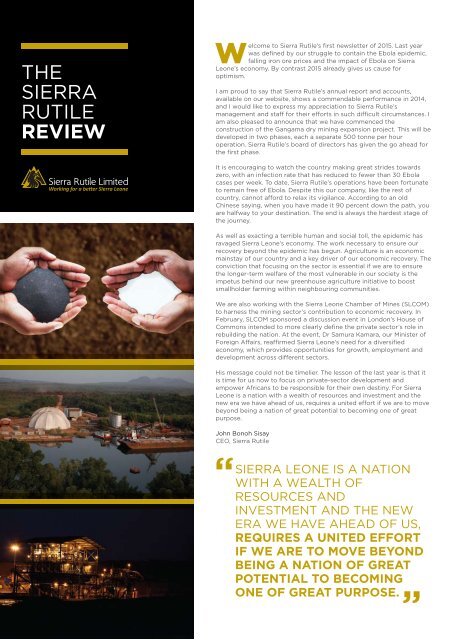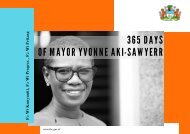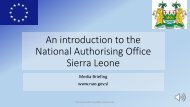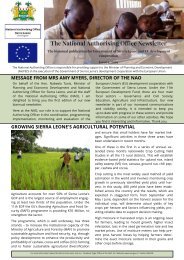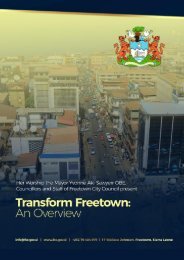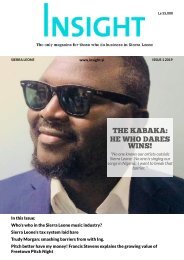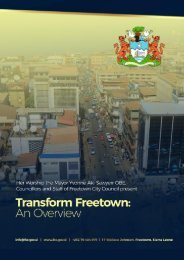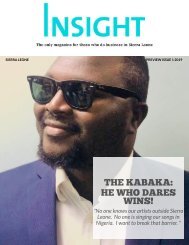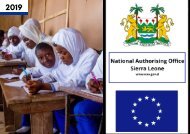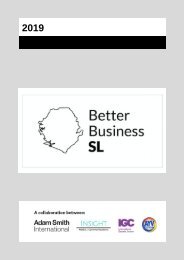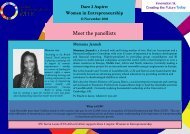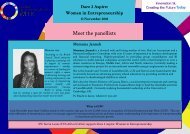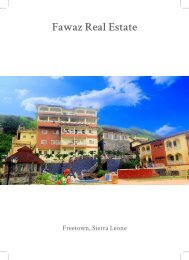The Sierra Rutile Review 1 2015
Newsletter produced for our client - the Sierra Rutile Review
Newsletter produced for our client - the Sierra Rutile Review
You also want an ePaper? Increase the reach of your titles
YUMPU automatically turns print PDFs into web optimized ePapers that Google loves.
THE<br />
SIERRA<br />
RUTILE<br />
REVIEW<br />
elcome to <strong>Sierra</strong> <strong>Rutile</strong>’s first newsletter of <strong>2015</strong>. Last year<br />
was defined by our struggle to contain the Ebola epidemic,<br />
falling iron ore prices and the impact of Ebola on <strong>Sierra</strong><br />
Leone’s economy. By contrast <strong>2015</strong> already gives us cause for<br />
optimism.<br />
I am proud to say that <strong>Sierra</strong> <strong>Rutile</strong>’s annual report and accounts,<br />
available on our website, shows a commendable performance in 2014,<br />
and I would like to express my appreciation to <strong>Sierra</strong> <strong>Rutile</strong>’s<br />
management and staff for their efforts in such difficult circumstances. I<br />
am also pleased to announce that we have commenced the<br />
construction of the Gangama dry mining expansion project. This will be<br />
developed in two phases, each a separate 500 tonne per hour<br />
operation. <strong>Sierra</strong> <strong>Rutile</strong>’s board of directors has given the go ahead for<br />
the first phase.<br />
It is encouraging to watch the country making great strides towards<br />
zero, with an infection rate that has reduced to fewer than 30 Ebola<br />
cases per week. To date, <strong>Sierra</strong> <strong>Rutile</strong>’s operations have been fortunate<br />
to remain free of Ebola. Despite this our company, like the rest of<br />
country, cannot afford to relax its vigilance. According to an old<br />
Chinese saying, when you have made it 90 percent down the path, you<br />
are halfway to your destination. <strong>The</strong> end is always the hardest stage of<br />
the journey.<br />
As well as exacting a terrible human and social toll, the epidemic has<br />
ravaged <strong>Sierra</strong> Leone’s economy. <strong>The</strong> work necessary to ensure our<br />
recovery beyond the epidemic has begun. Agriculture is an economic<br />
mainstay of our country and a key driver of our economic recovery. <strong>The</strong><br />
conviction that focusing on the sector is essential if we are to ensure<br />
the longer-term welfare of the most vulnerable in our society is the<br />
impetus behind our new greenhouse agriculture initiative to boost<br />
smallholder farming within neighbouring communities.<br />
We are also working with the <strong>Sierra</strong> Leone Chamber of Mines (SLCOM)<br />
to harness the mining sector’s contribution to economic recovery. In<br />
February, SLCOM sponsored a discussion event in London’s House of<br />
Commons intended to more clearly define the private sector’s role in<br />
rebuilding the nation. At the event, Dr Samura Kamara, our Minister of<br />
Foreign Affairs, reaffirmed <strong>Sierra</strong> Leone’s need for a diversified<br />
economy, which provides opportunities for growth, employment and<br />
development across different sectors.<br />
His message could not be timelier. <strong>The</strong> lesson of the last year is that it<br />
is time for us now to focus on private-sector development and<br />
empower Africans to be responsible for their own destiny. For <strong>Sierra</strong><br />
Leone is a nation with a wealth of resources and investment and the<br />
new era we have ahead of us, requires a united effort if we are to move<br />
beyond being a nation of great potential to becoming one of great<br />
purpose.<br />
John Bonoh Sisay<br />
CEO, <strong>Sierra</strong> <strong>Rutile</strong><br />
SIERRA LEONE IS A NATION<br />
WITH A WEALTH OF<br />
RESOURCES AND<br />
INVESTMENT AND THE NEW<br />
ERA WE HAVE AHEAD OF US,<br />
REQUIRES A UNITED EFFORT<br />
IF WE ARE TO MOVE BEYOND<br />
BEING A NATION OF GREAT<br />
POTENTIAL TO BECOMING<br />
ONE OF GREAT PURPOSE.<br />
“<br />
”
THE<br />
SIERRA<br />
RUTILE<br />
REVIEW<br />
SIERRA RUTILE’S $44 MILLION VOTE OF<br />
CONFIDENCE IN SIERRA LEONEAN ECONOMY<br />
GREENHOUSE AGRICULTURE TO BOOST SMALLHOLDER<br />
FARMERS IN SIERRA RUTILE’S MINING COMMUNITIES<br />
<strong>Sierra</strong> <strong>Rutile</strong> gave <strong>Sierra</strong> Leone’s Ebola-hit economy a big vote of confidence on 21 April <strong>2015</strong>, with the news that it is set to construct a<br />
$44 million dry mine at Gangama, substantially expanding its rutile mining operations in the South of <strong>Sierra</strong> Leone.<br />
Announcing the multi-million dollar investment at a meeting of international investors in London, John Bonoh Sisay, <strong>Sierra</strong> <strong>Rutile</strong>’s CEO<br />
said: “We are very excited to be embarking upon the next phase of <strong>Sierra</strong> <strong>Rutile</strong>’s expansion. <strong>Sierra</strong> <strong>Rutile</strong> is a strong company with a<br />
first class mining asset and operating team. Many other operators struggled to contain the impacts of Ebola, but we have worked<br />
tirelessly to mitigate these and emerge even stronger as an organisation. <strong>The</strong> Gangama expansion project is a significant investment in<br />
our operations and an important milestone in our history. As well as creating jobs in the area, both in the construction and operating<br />
phase, it will help secure the long-term future of the company and positions us well to become the world’s premier low-cost producer<br />
of high-grade mineral sands.”<br />
<strong>Sierra</strong> <strong>Rutile</strong> has been one of <strong>Sierra</strong> Leone’s leading mining companies, since it started operations 48 years ago. <strong>The</strong> company currently<br />
employs almost 2,250 people, either directly or through contractors, 95% of whom are <strong>Sierra</strong> Leone nationals.<br />
Commenting on the good news, the President of <strong>Sierra</strong> Leone, His Excellency Dr Ernest Bai Koroma said: “<strong>Sierra</strong> <strong>Rutile</strong>’s announcement<br />
of this major investment in its mining operations marks a turning point as we start to rebuild our economy following recent<br />
Ebola-related challenges. I am proud that one of <strong>Sierra</strong> Leone’s most important companies has not only weathered the Ebola storm, but<br />
is now emerging as a leading regional player in rebuilding our country’s future.”<br />
<strong>The</strong> construction of the new Gangama dry mining operation will be similar to <strong>Sierra</strong> <strong>Rutile</strong>’s previous expansion project – the Lanti dry<br />
mine, which was commissioned in January 2013. It will be developed in two phases, each capable of mining 500 tonnes per hour. <strong>Sierra</strong><br />
<strong>Rutile</strong>’s board of directors has approved the $44 million budget for the first phase of the project.<br />
Gangama Phase 1 is expected to drive down <strong>Sierra</strong> <strong>Rutile</strong>’s total operating cash costs to $595/t and all-in operating cash costs to<br />
$670/t on average over its first five years, cementing <strong>Sierra</strong> <strong>Rutile</strong>’s position in the global market as the premier low-cost producer of<br />
high quality rutile. Construction of Gangama Phase 1 will begin this quarter and take 12 months, with first production targeted for the<br />
second quarter of 2016.<br />
<strong>Sierra</strong> <strong>Rutile</strong> is working with agro-support specialists - Fresh<br />
Salone, on a greenhouse agriculture initiative intended to boost<br />
smallholder farming within neighbouring mining communities<br />
and contribute to <strong>Sierra</strong> Leone’s economic recovery.<br />
<strong>The</strong> US$45,000 agricultural livelihood sustainability project<br />
includes the construction of five greenhouses, training for 93<br />
farmers in agribusiness and modern farming techniques, a drip<br />
line irrigation system and the supply of fertiliser, seeds and<br />
pesticides to five farmer cooperatives in Imperi, Lower Banta,<br />
Upper Banta and Jong chiefdoms.<br />
<strong>Sierra</strong> <strong>Rutile</strong>’s Corporate Social Responsibility Manager, Jasmine<br />
Clerisme, says: “In 2012 we undertook a livelihood survey of our<br />
mining communities. This showed that 82% of the population<br />
engaged in farming lacked access to capital and quality inputs.<br />
This is because farming was largely done at a subsistence level<br />
with limited opportunities for generating sustainable income.<br />
<strong>The</strong> introduction of greenhouse agriculture provides an<br />
opportunity for smallholder farmers to increase their income<br />
and improve their business and financial management skills<br />
through targeted training.”<br />
As part of the initiative, the five cooperatives will enter into an<br />
agreement with ATS, <strong>Sierra</strong> <strong>Rutile</strong>’s catering service provider to<br />
supply produce at negotiated rates. ATS currently sources only<br />
18% of its supply needs from local farmers but the introduction<br />
of greenhouse agriculture is expected to increase this figure to<br />
95%, and provide a reliable market for local farmers.<br />
Commenting on the project, Alhaji Sidi Baun a master farmer<br />
with over 35 years of farming experience and head of the<br />
Matagelema Farmers Cooperative in the Lower Banta chiefdom,<br />
said: “<strong>The</strong> benefits that this initiative brings extend beyond the<br />
farmers who are directly involved, to the entire chiefdom. <strong>The</strong><br />
skills that we acquire will be learned for life and passed on,<br />
helping us greatly in our fight against poverty.<br />
SIERRA LEONE’S BUSINESS COMMUNITY CALLS FOR<br />
INVESTMENT-LED POST EBOLA ECONOMIC RECOVERY<br />
FIVE CHIEFDOMS WITHIN BONTHE AND MOYAMBA DISTRICTS<br />
RECEIVE LE 510 MILLION FROM SIERRA RUTILE TOWARDS<br />
AGRICULTURAL DEVELOPMENT FUND<br />
<strong>Sierra</strong> <strong>Rutile</strong> has paid US$120,000 (Le 510 million) towards agricultural development in the five chiefdoms in its area of operations as<br />
part of its corporate social obligations. <strong>The</strong> payment was witnessed by representatives from the Government of <strong>Sierra</strong> Leone.<br />
<strong>The</strong> money, which is based on <strong>Sierra</strong> <strong>Rutile</strong>’s annual profits, is paid directly to the Government through the Ministry of Agriculture<br />
Forestry and Food Security, the Ministry of Local Government and the Ministry of Mines and Mineral Resources. <strong>The</strong>se Ministries<br />
allocate the money among the chiefdoms, based on the extent to which their livelihoods have been affected by mining activities. This<br />
year Imperri Chiefdom received Le 180 million; Lower Banta Le 100 million; Upper Banta Le 90 million; Jong Le 90 million; and Bagruwa<br />
Le 50 million.<br />
When <strong>Sierra</strong> Leone’s business community and international<br />
investors came together earlier this year in London’s House of<br />
Commons, to discuss the post-Ebola economy at a Chamber of<br />
Mines sponsored event, the overwhelming message was that a<br />
sustainable economic recovery for <strong>Sierra</strong> Leone needed to be<br />
investment-led.<br />
<strong>The</strong> event - ‘Post Ebola economic renaissance in <strong>Sierra</strong> Leone<br />
and the role of the private sector’ - was chaired by British<br />
politician, the Right Honourable David Lammy MP and attended<br />
by over 150 international and national business people,<br />
financiers and investors. Representatives from <strong>Sierra</strong> Leone<br />
included Dr Samura Kamara, the Minister of Foreign Affairs;<br />
Momodu Kargbo, Governor of the Central Bank; Joseph Kamara,<br />
the Head of the Anti-Corruption Commission; Professor Monty<br />
Jones, Special Advisor to the President and H.E. Mr. Edward M.<br />
Turay, our High Commissioner to the UK.<br />
<strong>The</strong> opening speech was delivered by <strong>Sierra</strong> <strong>Rutile</strong>’s John Sisay,<br />
who is also President of the <strong>Sierra</strong> Leone Chamber of Mines. He<br />
emphasised the country’s resilience and economic potential.<br />
“<strong>Sierra</strong> Leone is a country that holds much promise. It has been<br />
tested over the years, but at every given occasion has shown<br />
itself capable of facing down its challenges. Our country has<br />
made resilience its backbone and real hope its oxygen. We are a<br />
small country of six million people, but we have big ambitions<br />
and our problems are small enough to fix.”<br />
Simon Cleasby, CEO of Addax Bioenergy - a large agri-industrial<br />
investment in <strong>Sierra</strong> Leone – gave the investor’s perspective. He<br />
told the audience that Addax’s experience of investment in<br />
<strong>Sierra</strong> Leone was positive, notwithstanding the immense<br />
challenges that the country is facing. “We started production in<br />
2014, have just made our first sales of bioethanol, and remain<br />
completely committed to our investment, as well as to <strong>Sierra</strong><br />
Leone,” he said.<br />
<strong>The</strong> keynote speaker, Dr Samura Kamara, Minister of Foreign<br />
Affairs, focused on economic diversification: “Mining is the main<br />
driver of revenue in <strong>Sierra</strong> Leone and the sector is estimated to<br />
provide about 300,000 jobs, which is second only to<br />
agriculture. As such it is extremely important to our future<br />
prosperity; however Ebola reaffirmed our need to diversify the<br />
economy, as we have learned from shocks such as this, and of<br />
course the civil war, that resilience depends on opportunities<br />
for growth, employment and development across different<br />
sectors.”<br />
Three other panellists - Mykay Kamara MD of A&A Investments<br />
and Services; Isha Johansen, President of SLFA; and Amara O<br />
Kuyateh, Deputy Director General of NASSIT - joined the<br />
speakers in answering questions from the audience.<br />
Capacity building emerged as a particular theme, with Mykay<br />
Kamara saying: “It’s incredibly important that we couple<br />
increased liquidity with capacity building. It is not just about<br />
injecting capital into companies. We have to do that alongside<br />
capacity development, across all aspects.”<br />
Kamara’s point was underscored by NASSIT’s Amara Kuyateh<br />
who said: “We need to invest in local leadership, building the<br />
systems that support it and investing in the capability of local<br />
people. <strong>Sierra</strong> <strong>Rutile</strong> is a testament to what investing in local<br />
leadership and local capabilities can achieve.”
THE<br />
SIERRA<br />
RUTILE<br />
REVIEW<br />
HOW THE POWER OF BUSINESS<br />
CAN HELP TACKLE EBOLA<br />
More than ten years on from <strong>Sierra</strong> Leone’s civil war, the country’s economy had been showing signs of improvement, recording double<br />
digit GDP growth in 2012 and 2013. <strong>The</strong> unprecedented arrival of Ebola in West Africa and its rapid spread added a completely new and<br />
dynamic business risk.<br />
As one of <strong>Sierra</strong> Leone’s largest employers, responsible for the direct and indirect employment of over 2,000 people, <strong>Sierra</strong> <strong>Rutile</strong><br />
quickly recognised Ebola’s potential for business disruption.<br />
What was immediately apparent was the need to keep our workforce<br />
safe. Our initial strategy was very simple and had three main elements:<br />
i) Awareness building (regularly providing staff with information about<br />
Ebola so they could recognise the disease and protect themselves);<br />
ii) Screening (checking the temperature of all employees and visitors to<br />
the mine site to keep potentially infected people out); and iii) Improved<br />
hygiene (providing increased facilities for hand washing).<br />
We also had to think beyond the mine. Mining operations of companies<br />
such as ours are based in remote rural areas and are closely linked with<br />
local communities. Around 60 percent of our workforce is from and/or<br />
lives in surrounding villages and we use many local suppliers and<br />
contractors. This tight interdependence between the company and the<br />
community meant our approach to managing Ebola had to extend<br />
beyond the mine itself and into the communities.<br />
Working with traditional local rulers and community representatives<br />
such as Paramount Chiefs, women’s groups, youth groups, district<br />
councils and local parliamentarians, we initiated a daily house-to-house<br />
temperature screening programme targeting an estimated 11,000<br />
people. We also collaborated with the local security forces to set up screening check points, supplying them with thermometers and<br />
chlorine. Equally important has been to circulate accurate and accessible information from the Ministry of Health, WHO and Centers for<br />
Disease Control.<br />
Perhaps the most visible sign of our response is the newly constructed quarantine and isolation unit in the grounds of our health clinic.<br />
Ebola’s disproportionate impact on health workers has been well-documented and dedicated training as well as protective equipment<br />
and clothing for them has been a crucially important investment.<br />
A successful response to Ebola is critical for national economic growth. <strong>The</strong> GDP of <strong>Sierra</strong> Leone, which had been projected to grow by<br />
over 11 percent in 2014 has since been revised down to 6.6 percent. While the facts don’t support the fear, the stigmatisation of the<br />
Ebola-affected countries has manifested itself in suspended flights, visa bans, an ‘Ebola tax’ (freight surcharge) added to transportation<br />
costs, and misinformation making travel in and out of the country difficult. This has hurt the Ebola response, as well as the <strong>Sierra</strong><br />
Leonean business community and generated anxiety among international investors.<br />
Notwithstanding these challenges, we have managed to keep our operations going with minimal disruption. Over one year on, our<br />
workforce remains Ebola free and our response has been pivotal in maintaining a robust operational performance. We sustained<br />
improvements in cost efficiency and completed on budget the upgrade of our mineral separation plant. We also continued with our<br />
expansion projects and have maintained a strong balance sheet.<br />
Ebola has tested our resolve as a company, and also that of the country. What our experience clearly shows though is that we must<br />
face such tests head on, including engaging widely with the local community and the rest of the private sector to come through the<br />
other side.<br />
“<br />
WORKING WITH TRADITIONAL LOCAL RULERS AND<br />
COMMUNITY REPRESENTATIVES SUCH AS PARAMOUNT<br />
CHIEFS, WOMEN’S GROUPS, YOUTH GROUPS, DISTRICT<br />
COUNCILS AND LOCAL PARLIAMENTARIANS, WE<br />
INITIATED A DAILY HOUSE-TO-HOUSE TEMPERATURE<br />
SCREENING PROGRAMME TARGETING AN ESTIMATED<br />
11,000 PEOPLE.<br />
”<br />
Newsletter produced by Elixir Marketing & Media


